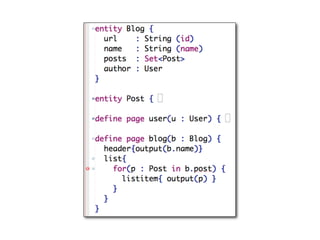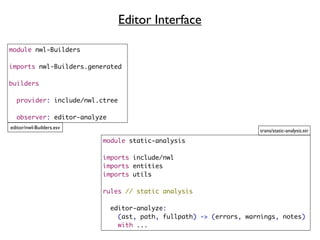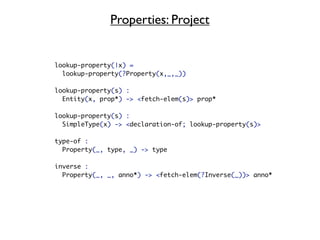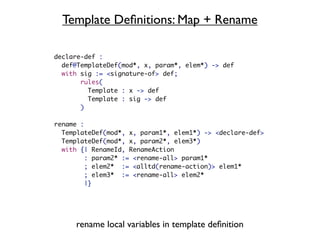Model-Driven Software Development - Static Analysis & Error Checking
- 1. Static Analysis & Error Checking Lecture 9 Course IN4308 Eelco Visser Master Computer Science http://eelcovisser.org Delft University of Technology
- 2. Coming up Lecture 8: Context-sensitive transformation ★ design 2 ★ transformation with dynamic rewrite rules Lecture 9: Static analysis & error checking ★ name resolution, reference resolution ★ type analysis Lecture 10: Code generation ★ string templates, code generation by model transformation ★ concrete object syntax Lecture 11: Code generation strategies ★ customization of generated code
- 4. Consistency Checking Syntax definition ★ what are well-formed sentences? Static analysis ★ not all ‘well-formedness’ properties are context-free ★ consistency of compositions ★ consistency of expressions wrt declarations Error reporting ★ indicate errors in editor ★ use sensible error message
- 7. Consistency Checking: Ingredients Editor Interface ★ collecting and displaying errors, warnings Error checking ★ checking static constraints and reporting errors Type analysis ★ computing types of expressions Name resolution ★ disambiguation of names Reference resolving ★ linking identifiers to declarations
- 8. Consistency Checking: Generic Approach Rename ★ make identifiers unique Map ★ map identifiers to declarations Project ★ compute properties of declarations, expressions Check ★ check constraints
- 9. Editor Interface module nwl-Builders imports nwl-Builders.generated builders provider: include/nwl.ctree observer: editor-analyze editor/nwl-Builders.esv trans/static-analysis.str module static-analysis imports include/nwl imports entities imports utils rules // static analysis editor-analyze: (ast, path, fullpath) -> (errors, warnings, notes) with ...
- 10. Editor Interface editor-analyze: (ast, path, fullpath) -> (errors, warnings, notes) with errors := <collect-all(check, conc)> ast; warnings := <collect-all(constraint-warning, conc)> ast; notes := <collect-all(constraint-note, conc)> ast
- 11. Error Checking Rules check : context -> (target, error) where assumption where require(constraint) require(s) = not(s) – Context: identifying points in the code to check – Assumptions: only report an error if certain assumptions hold (validating the context and avoiding spurious errors) – Constraints: checking for constraints at the context – Formulating an error message – Attribution of the error to a particular character range in the source text (usually, only part of the context
- 12. Error Checking: Binary Operators check : e@BinOp(e1, op, e2) -> (e, $[operator [op] not defined for [<pp>t1] and [<pp>t2]]) where t1 := <type-of> e1 where t2 := <type-of> e2 where require(<type-of> e)
- 13. Pretty-Printing with String Interpolation pp : Entity(x, prop*) -> $[entity [x] { [<map(pp)>prop*] }] pp : Property(x,t) -> $[[x] : [<pp>t] ] pp : SimpleType(x) -> x pp : SetType(t) -> $[Set<[<pp> t]>] pp : [] -> $[] pp : [t] -> <pp>t pp : [t1,t2|ts] -> $[[<pp>t1],[<pp>[t2|ts]]]
- 14. Origin Tracking check : e@BinOp(e1, op, e2) -> (e, $[operator [op] not defined for [<pp>t1] and [<pp>t2]]) where ... Assign( Var("x") , BinOp( IntLit("2") , "+" , BinOp(IntLit("3"), "+", StringLit("4")) ) ) Assign( Var("x") , Plus(IntLit("2"), Times(IntLit("3"), StringLit("4"))) )
- 15. Error Checking: Control-Flow Statements check : While(e, b) -> (e, $[Expression should have type Bool]) where t := <type-of> e where require(<eq>(t, SimpleType("Bool"))) check : If(e, b1, b2) -> (e, $[Expression should have type Bool]) where t := <type-of> e where require(<eq>(t,SimpleType("Bool"))) check : For(x, t, e, elem*) -> (e, $[[<pp>SetType(t)] expected]) where t2 := <type-of> e where require(<eq>(t2,SetType(t))) check rules follow the same pattern: type analysis + local consistency check
- 16. Type Analysis type-of : e -> t compute type of expression
- 17. Type Analysis: Literals type-of : StringLit(x) -> SimpleType("String") type-of : IntLit(x) -> SimpleType("Int")
- 18. Type Analysis: Binary Operators type-of : BinOp(e1, op, e2) -> t where t := <function-type>(op, [<type-of>e1, <type-of>e2]) function-type : ("+", [SimpleType("String"), SimpleType("String")]) -> SimpleType("String") function-type : ("+", [SimpleType("Int"), SimpleType("Int")]) -> SimpleType("Int") function-type : ("-", [SimpleType("Int"), SimpleType("Int")]) -> SimpleType("Int")
- 19. Type Analysis BinOp( IntLit("2") , "+" , BinOp( IntLit("3"), "+", IntLit("4") ) )
- 20. Type Analysis BinOp( IntLit("2") , "+" , BinOp( type-of IntLit("3"), SimpleType("Int") "+", type-of IntLit("4") SimpleType("Int") ) )
- 21. Type Analysis BinOp( type-of IntLit("2") SimpleType("Int") , "+" type-of , BinOp( SimpleType("Int") IntLit("3"), "+", IntLit("4") ) )
- 22. Type Analysis type-of BinOp( SimpleType("Int") IntLit("2") , "+" , BinOp( IntLit("3"), "+", IntLit("4") ) )
- 23. Type Analysis: What is Type of Variable? define page root(x : Int) { action exptest() { for(y : Int in {1,2,x}) { x := x + y; } } type-of : } Var(x) -> t where t := ??? Assign( Var("x") , BinOp(Var("x"), "+", Var("y")) ) type of variable not part of variable use
- 24. Variables: Map declare-all = alltd(declare) declare : Param(x, t) -> Param(x, t) with rules( TypeOf : x -> t ) type-of : Var(x) -> t where t := <TypeOf> x
- 25. Scope define page root(x : Int) { action exptest() { for(x : Int in {1,2,x}) { print(x); } } } multiple occurrences of same identifier corresponding to different declarations
- 26. Variables: Map + Rename rename-all = alltd(rename) rename : Param(x, t) -> Param(y, t) with y := <rename-var>(x, t) unique annotation rename-var : (x, t) -> y with y := x{<new>}; map variable to type rules( TypeOf : y -> t RenameId : x -> y ) rename occurrences rename : Var(x) -> Var(y) where y := <RenameId> x type-of : Var(x) -> t where t := <TypeOf> x
- 27. Term Annotations t{t1,...,tn} add additional information to term without affecting signature
- 28. Variables: Check check : e@Var(x) -> (e, $[Variable '[x]' not declared]) where require(<type-of>e)
- 29. Variable Binding Constructs rename : For(x, t, e1, stat1*) -> For(y, t, e2, stat2*) with e2 := <rename-all> e1 with {| RenameId : y := <rename-var>(x, t) ; stat2* := <rename-all> stat1* |} For defines local variable x in body stat1*’
- 30. Assignment is-lvalue = ?Var(_) <+ ?PropertyAccess(_, _) check : Assign(e1, e2) -> (e1, $[Left-hand side of assignment should be variable or property access]) where require(<is-lvalue> e1) check : Assign(e1, e2) -> (<id>, $[Type of lhs ('[<pp>t1]') does not match type of rhs ('[<pp>t2]')]) where t1 := <type-of>e1 where t2 := <type-of>e2 where require(<eq>(t1, t2))
- 31. Editor Interface with Analysis editor-analyze: (ast, path, fullpath) -> (errors, warnings, notes) with ast2 := <analyze> ast; errors := <collect-all(check, conc)> ast2; warnings := <collect-all(constraint-warning, conc)> ast2; notes := <collect-all(constraint-note, conc)> ast2 analyze = rename-all
- 32. Rename, Map, Project, Check Rename ★ make local variables unique Map ★ variables to their type Project ★ compute type of expressions Check ★ check constraints using types
- 34. Consistency of Data Model Declarations entity Blog { url : String (id) name : String (name) posts : Set<Post> author : User } entity Post { url : String (id) title : String (name) text : WikiText blog : Blog (inverse:posts) author : User blog : Blog version : Int }
- 35. Consistency Constraints for Data Models Unique declarations ★ entity names unique in model ★ property names unique in entity Valid types ★ type is either primitive types (e.g. String) or declared entity type Inverse properties ★ should refer to existing entity with existing property
- 36. Rename; Map; Project; Check Rename ★ not needed: top-level declarations have global scope Map ★ map identifier to AST of declaration Project ★ lookup information in declaration Check ★ check consistency using map & project
- 37. Entity Declarations: Map & Project declare-def: ent@Entity(x, prop*) -> Entity(x, prop*) Map with rules( EntityDeclaration : x -> ent ) declaration-of : SimpleType(x) -> <EntityDeclaration> x carrier-type = try(?SetType(<id>)) is-entity-type = where(SimpleType(EntityDeclaration)) is-simple-type = is-primitive-type <+ is-entity-type name-of : Entity(x, prop*) -> x Project type-of : Entity(x, prop*) -> SimpleType(x)
- 38. Entity Declarations: Check check : ent@Entity(x, prop*) -> (x, $[Entity '[x]' defined more than once]) where require(<EntityDeclaration> x => ent) check : t@SimpleType(x) -> (x, $[Type '[x]' is not defined]) where require(<is-simple-type>t) check : t@SetType(type) -> (t, $[Set should have entity type as argument]) where <is-simple-type> type where require(<is-entity-type> type)
- 39. Properties: Project lookup-property(|x) = lookup-property(?Property(x,_,_)) lookup-property(s) : Entity(x, prop*) -> <fetch-elem(s)> prop* lookup-property(s) : SimpleType(x) -> <declaration-of; lookup-property(s)> type-of : Property(_, type, _) -> type inverse : Property(_, _, anno*) -> <fetch-elem(?Inverse(_))> anno*
- 40. Properties: Check check: ent@Entity(x, prop*) -> errors where errors := <filter(check-property(|ent))> prop* where require(<not(?[])> errors) check-property(|ent) : Property(name, type, annos) -> (name, $[Property '[name]' defined more than once]) where require(<type-of><lookup-property(|name)>ent => type)
- 41. Inverse Property: Check check-property(|ent) : prop@Property(f, t, annos) -> (g, $[Inverse relation requires entity type]) where Inverse(g) := <inverse>prop where tc := <carrier-type> t where <is-simple-type> tc where require(<is-entity-type> tc)
- 42. Inverse Property: Check check: ent@Entity(x, prop*) -> errors where errors := <filter(check-property(|ent)); not(?[])> prop* check-property(|ent) : Property(f, t, annos) -> (g, $[Inverse relation requires entity type]) where Inverse(g) := <inverse> where tc := <carrier-type> t where <is-simple-type> tc // non-existing type already produces error message where require(<is-entity-type> tc) check-property(|ent1) : Property(f, t, annos) -> (g, $[Entity '[<pp>tc]' has no property '[g]']) where Inverse(g) := <inverse> where tc := <carrier-type> t where <is-entity-type> tc where require(<lookup-property(|g)> tc) check-property(|ent) : Property(f, t, anno*) -> (g, $[Type of '[<pp>t1].[g]' should be [<pp>t3] or [<pp>SetType(t3)]]) where Inverse(g) := <inverse> where t1 := <carrier-type> t where t2 := <lookup-property(|g); type-of; carrier-type> t1 where t3 := <type-of>ent where require(<eq>(t2, t3)) multiple check rules necessary to check different cases
- 43. Property References type-of : PropertyAccess(e, f) -> <type-of; lookup-property(|f); type-of> e check : e1@PropertyAccess(e2, f) -> (f, $[[<pp>t] has no property '[f]]) where t := <type-of> e2 where require(<type-of>e1)
- 45. define page editpost(p : Post) { Template Consistency action save() { p.version := p.version + 1; return post(p); } header{output(p.title)} form{ input(p.url) input(p.title) input(p.text) Template definitions submit save() { "Save" } } ★ should be unique } Template references ★ to existing definition ★ consistent with parameter declarations
- 46. define page editpost(p : Post) { Template AST action save() { p.version := p.version + 1; return post(p); } header{output(p.title)} TemplateDef( form{ [Page()] , "editpost" input(p.url) , [Param("p", SimpleType("Post"))] input(p.title) , [ Action( input(p.text) "save" , [] submit save() { "Save" } , [ Assign( } PropertyAccess(Var("p"), "version") } , Plus(PropertyAccess(Var("p"), "version"), IntLit("1")) ) , ReturnPage(PageRef("post", [Var("p")])) ] ) , CallElems( "header" , [CallArgs("output", [PropertyAccess(Var("p"), "title")])] ) , CallElems( "form" , [ CallArgs("input", [PropertyAccess(Var("p"), "url")]) , CallArgs("input", [PropertyAccess(Var("p"), "title")]) , CallArgs("input", [PropertyAccess(Var("p"), "text")]) , Submit("save", [], [String(""Save"")]) ] ) ] )
- 47. Template Definitions: Map + Rename declare-def : def@TemplateDef(mod*, x, param*, elem*) -> def with sig := <signature-of> def; rules( Template : x -> def Template : sig -> def ) rename : TemplateDef(mod*, x, param1*, elem1*) -> <declare-def> TemplateDef(mod*, x, param2*, elem3*) with {| RenameId, RenameAction : param2* := <rename-all> param1* ; elem2* := <alltd(rename-action)> elem1* ; elem3* := <rename-all> elem2* |} rename local variables in template definition
- 48. Template Definitions: Project is-page-def = ?TemplateDef([Page()],_,_,_) param-types = is-list; map(?Param(_,<id>)) param-types : TemplateDef(mod*, x, param*, elem*) -> <param-types> param* signature-of : TemplateDef(mod*, x, param*, elem*) -> (x, <param-types>param*) declaration-of : TemplateDef(mod*, x, param*, elem*) -> <signature-of; Template> declaration-of : Navigate(ref, elems) -> <declaration-of> ref declaration-of : PageRef(x, e*) -> <Template> x call-of : PageRef(x, e*) -> (x, e*)
- 49. Template Definitions: Check Uniqueness check : def@TemplateDef(mod*, x, param*, elem*) -> (x, $[Multiple definitions for page '[x]']) where <is-page-def> def where require(<Template> x => def) check : def@TemplateDef(mod*, x, param*, elem*) -> (x, $[Multiple definitions for template with signature [sig]]) where not(is-page-def) where require(<declaration-of> def => def) where sig := <signature-of;pp-sig> def
- 50. Checking Template/Page/Function Calls List of expressions consistent with list of types ★ zip Multiple possible error causes ★ call of non-existing definition ★ parameter arity mismatch ★ argument type mismatch Argument checking reusable
- 51. Templates: Check Page References check : PageRef(x, e*) -> (x, $[Navigation to non-existing page]) where require(declaration-of) check : PageRef(x, e*) -> [(x, $[Navigation to template '[x]' (not a page)])] where def := <declaration-of> where require(<is-page-def> def) check : PageRef(x, e*) -> <check-args>
- 52. Template Call: Project signature-of : Call(x, e*, elem*) -> (x, <map(type-of)> e*) call-of : Call(x, e*, elem*) -> (x, e*) declaration-of : Call(x, e*, elem*) -> <signature-of; Template> is-primitive-template = ?"input" <+ ?"output" <+ ?"form"
- 53. Templates: Check Template Calls check : Call(x, e*, elem*) -> (x, $[Template '[x]' is not defined]) where not(<is-primitive-template> x) where require(<Template> x) check : Call(x, e*, elem*) -> (x, $[No definition for template with signature '[x]([<map(type-of);pp> e*])']) where not(<is-primitive-template> x) where <Template> x where require(declaration-of) constraint-warning : Call(x, e*, elem*) -> [(x, $[Page definition is used as template])] where def := <declaration-of> where require(not(<is-page-def> def)) check : Call(x, e*, elem*) -> <check-args>
- 54. Checking Call Arguments check-args = !(<call-of>, <declaration-of>); (check-arg-types <+ check-args-arity) check-arg-types : ((f, e*), def) -> errors where errors := <zip; filter(check-arg); not(?[])> (e*, <param-types> def) check-arg : (e, t) -> (e, $[Argument of type '[<pp>t]' expected (not of type '[<pp>t2]')]) where t2 := <type-of> e where require(<eq>(t, t2)) check-args-arity : ((f, e*), def) -> [(f, $['[f]' expects [<int-to-string>l] arguments; [<int-to-string>k] provided])] with k := <length>e* with l := <param-types; length> def where require(<eq>(k, l))
- 56. Reference Resolution Aiding program navigation ★ Hover-click on identifier to jump to declaration Reuse name resolution infrastructure
- 57. Reference Resolution module nwl-References imports nwl-References.generated references reference _ : editor-resolve editor-resolve: (source, position, ast, path, fullpath) -> target where target := <compute-target> source
- 58. From Use to Declaration editor-resolve: (SimpleType(type), position, ast, path, fullpath) -> target where Entity(target,_) := <EntityDeclaration> type editor-resolve: (ref@PageRef(x,e*), position, ast, path, fullpath) -> target where TemplateDef(_,target,_,_) := <declaration-of> ref
- 59. Schedule Case 3 ★ Syntax definition & term rewriting ★ Deadline: May 4 Design 2 ★ Make a proposal (can be submitted separately) ★ Deadline: May 5 Lab this week ★ Finish Case 3 ★ Syntax for Design 2 Next ★ Lecture 10: code generation












![Error Checking: Binary Operators
check :
e@BinOp(e1, op, e2) ->
(e, $[operator [op] not defined for [<pp>t1] and [<pp>t2]])
where t1 := <type-of> e1
where t2 := <type-of> e2
where require(<type-of> e)](https://image.slidesharecdn.com/mdsd09-100428042747-phpapp01/85/Model-Driven-Software-Development-Static-Analysis-Error-Checking-12-320.jpg)
![Pretty-Printing with String Interpolation
pp : Entity(x, prop*) ->
$[entity [x] {
[<map(pp)>prop*]
}]
pp : Property(x,t) ->
$[[x] : [<pp>t]
]
pp : SimpleType(x) -> x
pp : SetType(t) -> $[Set<[<pp> t]>]
pp : [] -> $[]
pp : [t] -> <pp>t
pp : [t1,t2|ts] -> $[[<pp>t1],[<pp>[t2|ts]]]](https://image.slidesharecdn.com/mdsd09-100428042747-phpapp01/85/Model-Driven-Software-Development-Static-Analysis-Error-Checking-13-320.jpg)
![Origin Tracking
check :
e@BinOp(e1, op, e2) ->
(e, $[operator [op] not defined for [<pp>t1] and [<pp>t2]])
where ...
Assign(
Var("x")
, BinOp(
IntLit("2")
, "+"
, BinOp(IntLit("3"), "+", StringLit("4"))
)
)
Assign(
Var("x")
, Plus(IntLit("2"), Times(IntLit("3"), StringLit("4")))
)](https://image.slidesharecdn.com/mdsd09-100428042747-phpapp01/85/Model-Driven-Software-Development-Static-Analysis-Error-Checking-14-320.jpg)
![Error Checking: Control-Flow Statements
check :
While(e, b) -> (e, $[Expression should have type Bool])
where t := <type-of> e
where require(<eq>(t, SimpleType("Bool")))
check :
If(e, b1, b2) -> (e, $[Expression should have type Bool])
where t := <type-of> e
where require(<eq>(t,SimpleType("Bool")))
check :
For(x, t, e, elem*) -> (e, $[[<pp>SetType(t)] expected])
where t2 := <type-of> e
where require(<eq>(t2,SetType(t)))
check rules follow the same pattern: type analysis + local consistency check](https://image.slidesharecdn.com/mdsd09-100428042747-phpapp01/85/Model-Driven-Software-Development-Static-Analysis-Error-Checking-15-320.jpg)


![Type Analysis: Binary Operators
type-of :
BinOp(e1, op, e2) -> t
where t := <function-type>(op, [<type-of>e1, <type-of>e2])
function-type :
("+", [SimpleType("String"), SimpleType("String")]) -> SimpleType("String")
function-type :
("+", [SimpleType("Int"), SimpleType("Int")]) -> SimpleType("Int")
function-type :
("-", [SimpleType("Int"), SimpleType("Int")]) -> SimpleType("Int")](https://image.slidesharecdn.com/mdsd09-100428042747-phpapp01/85/Model-Driven-Software-Development-Static-Analysis-Error-Checking-18-320.jpg)









![Variables: Check
check :
e@Var(x) -> (e, $[Variable '[x]' not declared])
where require(<type-of>e)](https://image.slidesharecdn.com/mdsd09-100428042747-phpapp01/85/Model-Driven-Software-Development-Static-Analysis-Error-Checking-28-320.jpg)

![Assignment
is-lvalue =
?Var(_) <+ ?PropertyAccess(_, _)
check :
Assign(e1, e2) -> (e1, $[Left-hand side of assignment should
be variable or property access])
where require(<is-lvalue> e1)
check :
Assign(e1, e2) -> (<id>, $[Type of lhs ('[<pp>t1]') does not
match type of rhs ('[<pp>t2]')])
where t1 := <type-of>e1
where t2 := <type-of>e2
where require(<eq>(t1, t2))](https://image.slidesharecdn.com/mdsd09-100428042747-phpapp01/85/Model-Driven-Software-Development-Static-Analysis-Error-Checking-30-320.jpg)







![Entity Declarations: Check
check :
ent@Entity(x, prop*) -> (x, $[Entity '[x]' defined more than once])
where require(<EntityDeclaration> x => ent)
check :
t@SimpleType(x) -> (x, $[Type '[x]' is not defined])
where require(<is-simple-type>t)
check :
t@SetType(type) -> (t, $[Set should have entity type as argument])
where <is-simple-type> type
where require(<is-entity-type> type)](https://image.slidesharecdn.com/mdsd09-100428042747-phpapp01/85/Model-Driven-Software-Development-Static-Analysis-Error-Checking-38-320.jpg)

![Properties: Check
check:
ent@Entity(x, prop*) -> errors
where errors := <filter(check-property(|ent))> prop*
where require(<not(?[])> errors)
check-property(|ent) :
Property(name, type, annos) -> (name,
$[Property '[name]' defined more than once])
where require(<type-of><lookup-property(|name)>ent => type)](https://image.slidesharecdn.com/mdsd09-100428042747-phpapp01/85/Model-Driven-Software-Development-Static-Analysis-Error-Checking-40-320.jpg)
![Inverse Property: Check
check-property(|ent) :
prop@Property(f, t, annos) -> (g, $[Inverse relation requires entity type])
where Inverse(g) := <inverse>prop
where tc := <carrier-type> t
where <is-simple-type> tc
where require(<is-entity-type> tc)](https://image.slidesharecdn.com/mdsd09-100428042747-phpapp01/85/Model-Driven-Software-Development-Static-Analysis-Error-Checking-41-320.jpg)
![Inverse Property: Check
check:
ent@Entity(x, prop*) -> errors
where errors := <filter(check-property(|ent)); not(?[])> prop*
check-property(|ent) :
Property(f, t, annos) -> (g, $[Inverse relation requires entity type])
where Inverse(g) := <inverse>
where tc := <carrier-type> t
where <is-simple-type> tc // non-existing type already produces error message
where require(<is-entity-type> tc)
check-property(|ent1) :
Property(f, t, annos) -> (g, $[Entity '[<pp>tc]' has no property '[g]'])
where Inverse(g) := <inverse>
where tc := <carrier-type> t
where <is-entity-type> tc
where require(<lookup-property(|g)> tc)
check-property(|ent) :
Property(f, t, anno*) -> (g, $[Type of '[<pp>t1].[g]' should be [<pp>t3] or [<pp>SetType(t3)]])
where Inverse(g) := <inverse>
where t1 := <carrier-type> t
where t2 := <lookup-property(|g); type-of; carrier-type> t1
where t3 := <type-of>ent
where require(<eq>(t2, t3))
multiple check rules necessary to check different cases](https://image.slidesharecdn.com/mdsd09-100428042747-phpapp01/85/Model-Driven-Software-Development-Static-Analysis-Error-Checking-42-320.jpg)
![Property References
type-of :
PropertyAccess(e, f) -> <type-of; lookup-property(|f); type-of> e
check :
e1@PropertyAccess(e2, f) -> (f, $[[<pp>t] has no property '[f]])
where t := <type-of> e2
where require(<type-of>e1)](https://image.slidesharecdn.com/mdsd09-100428042747-phpapp01/85/Model-Driven-Software-Development-Static-Analysis-Error-Checking-43-320.jpg)


![define page editpost(p : Post) {
Template AST action save() {
p.version := p.version + 1;
return post(p);
}
header{output(p.title)}
TemplateDef( form{
[Page()]
, "editpost" input(p.url)
, [Param("p", SimpleType("Post"))] input(p.title)
, [ Action(
input(p.text)
"save"
, [] submit save() { "Save" }
, [ Assign( }
PropertyAccess(Var("p"), "version")
}
, Plus(PropertyAccess(Var("p"), "version"), IntLit("1"))
)
, ReturnPage(PageRef("post", [Var("p")]))
]
)
, CallElems(
"header"
, [CallArgs("output", [PropertyAccess(Var("p"), "title")])]
)
, CallElems(
"form"
, [ CallArgs("input", [PropertyAccess(Var("p"), "url")])
, CallArgs("input", [PropertyAccess(Var("p"), "title")])
, CallArgs("input", [PropertyAccess(Var("p"), "text")])
, Submit("save", [], [String(""Save"")])
]
)
]
)](https://image.slidesharecdn.com/mdsd09-100428042747-phpapp01/85/Model-Driven-Software-Development-Static-Analysis-Error-Checking-46-320.jpg)

![Template Definitions: Project
is-page-def =
?TemplateDef([Page()],_,_,_)
param-types =
is-list; map(?Param(_,<id>))
param-types :
TemplateDef(mod*, x, param*, elem*) -> <param-types> param*
signature-of :
TemplateDef(mod*, x, param*, elem*) -> (x, <param-types>param*)
declaration-of :
TemplateDef(mod*, x, param*, elem*) -> <signature-of; Template>
declaration-of :
Navigate(ref, elems) -> <declaration-of> ref
declaration-of :
PageRef(x, e*) -> <Template> x
call-of :
PageRef(x, e*) -> (x, e*)](https://image.slidesharecdn.com/mdsd09-100428042747-phpapp01/85/Model-Driven-Software-Development-Static-Analysis-Error-Checking-48-320.jpg)
![Template Definitions: Check Uniqueness
check :
def@TemplateDef(mod*, x, param*, elem*) ->
(x, $[Multiple definitions for page '[x]'])
where <is-page-def> def
where require(<Template> x => def)
check :
def@TemplateDef(mod*, x, param*, elem*) ->
(x, $[Multiple definitions for template with signature [sig]])
where not(is-page-def)
where require(<declaration-of> def => def)
where sig := <signature-of;pp-sig> def](https://image.slidesharecdn.com/mdsd09-100428042747-phpapp01/85/Model-Driven-Software-Development-Static-Analysis-Error-Checking-49-320.jpg)

![Templates: Check Page References
check :
PageRef(x, e*) -> (x, $[Navigation to non-existing page])
where require(declaration-of)
check :
PageRef(x, e*) -> [(x, $[Navigation to template '[x]' (not a page)])]
where def := <declaration-of>
where require(<is-page-def> def)
check :
PageRef(x, e*) -> <check-args>](https://image.slidesharecdn.com/mdsd09-100428042747-phpapp01/85/Model-Driven-Software-Development-Static-Analysis-Error-Checking-51-320.jpg)

![Templates: Check Template Calls
check :
Call(x, e*, elem*) -> (x, $[Template '[x]' is not defined])
where not(<is-primitive-template> x)
where require(<Template> x)
check :
Call(x, e*, elem*) -> (x, $[No definition for template with
signature '[x]([<map(type-of);pp> e*])'])
where not(<is-primitive-template> x)
where <Template> x
where require(declaration-of)
constraint-warning :
Call(x, e*, elem*) -> [(x, $[Page definition is used as template])]
where def := <declaration-of>
where require(not(<is-page-def> def))
check :
Call(x, e*, elem*) -> <check-args>](https://image.slidesharecdn.com/mdsd09-100428042747-phpapp01/85/Model-Driven-Software-Development-Static-Analysis-Error-Checking-53-320.jpg)
![Checking Call Arguments
check-args =
!(<call-of>, <declaration-of>);
(check-arg-types <+ check-args-arity)
check-arg-types :
((f, e*), def) -> errors
where errors := <zip; filter(check-arg); not(?[])> (e*, <param-types> def)
check-arg :
(e, t) -> (e, $[Argument of type '[<pp>t]' expected (not of type '[<pp>t2]')])
where t2 := <type-of> e
where require(<eq>(t, t2))
check-args-arity :
((f, e*), def) -> [(f, $['[f]' expects [<int-to-string>l] arguments;
[<int-to-string>k] provided])]
with k := <length>e*
with l := <param-types; length> def
where require(<eq>(k, l))](https://image.slidesharecdn.com/mdsd09-100428042747-phpapp01/85/Model-Driven-Software-Development-Static-Analysis-Error-Checking-54-320.jpg)




